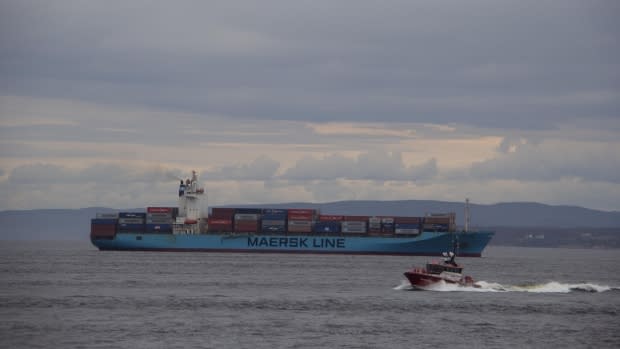Seafarers union blames lenient Transport Canada policy for merchant sailor's death
The International Transport Workers Federation says a long-standing Transport Canada policy directly contributed to the presumed death of a seafarer on a container ship who went overboard into the St. Lawrence River near Les Escoumins, Que., Sunday.
The Canadian Coast Guard suspended its search for the seafarer Monday.
He's been identified as 31-year-old Sri Lankan Ravindu Lakmal Pieris Telge, the ship's second officer.
Vince Giannopoulos, an inspector with the ITF, whose affiliated trade unions include merchant sailors, spoke with crew members aboard the Maersk Patras when it docked in Montreal Tuesday.
The crew members told Giannopoulos the second officer was unlashing containers when he fell.
"That's when the metal bars that are the main mechanism for securing the containers are undone and untied," Giannopoulos told CBC News.
'Recipe for disaster'
Giannopoulos said that at almost every other port in the world, the unlashing of containers is done by dock workers — and only once ships are safely berthed.
The Port of Montreal is an exception.
Giannopoulos said Transport Canada rules make it one of the few ports in the world that allows seafarers to unlash containers before ships arrive in port.

"It's a very precarious job at the best of times. It's one of the most dangerous jobs that happens on the waterfront," said Peter Lahay, Canadian co-ordinator for the ITF.
"When you compound that with doing it at sea, often in challenging weather conditions, it's a recipe for disaster," Lahay said.
Heavy, precarious work
Unlashing containers requires using a long metal bar to unscrew bolts that hold them in place.
Giannopoulos said the bars are often heavy and long, as was the one used by the crew member who went overboard Sunday.
"The bar weighed 23 kilograms and was four and a half metres long. So you've got this really awkward object that you're trying to manoeuvre," Giannopoulos said.
"Basically, the weight of the object kind of got the better of him. He was holding it straight up in a vertical sense, to try and unlock one of the containers," Giannopoulos said.
"It swayed a little bit too much, and the weight of the bar took him over the railing, and he went overboard," he said.
"If the seafarers weren't doing the unlashing while the ship was underway, this quite literally couldn't have happened," Giannopoulos concluded.
Transport Canada OKs practice, despite warnings
Rules set by Transport Canada allow ships bound for Montreal to begin unlashing once they reach Les Escoumins.
Lahay said it's the only port in Canada and one of few in the world where that is allowed.
He said both the port authority and the shipping companies encourage the practice, because it allows containers to be unloaded more quickly once in port.
"Captains have told us over the years that they don't find it safe, but if they don't do it, the company essentially says, 'If you don't do it, we'll find someone who can,'" said Giannopoulos.
"They might not technically be forced, but the reality of the situation is they are."
Lahay said because of how dangerous it is for seafarers, the ITF met with Transport Canada officials a year ago to urge them to ban the practice on the St. Lawrence River.
He said they had a couple of meetings, but nothing's changed.
"It went silent, actually," Lahay said.
"I'm not shocked. I've been in the marine industry for a long time. It's a high-pressure, competitive industry. There's a strong client-government relationship," he said.
"I think the port needs to step up and follow the standards of every other major port in the world," Giannopoulos said.
"There's no reason why the Port of Montreal needs to lower its standards for efficiency. There's no reason why safety needs to take a backseat," he said.
The Canadian Union of Public Employees, which represents longshoremen at the Port of Montreal, issued a statement Thursday urging Transport Canada and the port authority to end the practice immediately.
CUPE said it has already asked Transport Canada and the port to do that many times.
"Last year, the death of a whale in the St. Lawrence River led to rapid changes to the regulations governing the navigation of large vessels. A human life is just as important," said CUPE in its statement.
Transport Canada, Port respond
Mélanie Nadeau, a spokesperson for the Port of Montreal, responded to CBC News in an email.
"There is no rule at the Port of Montreal that imposes unlashing aboard a vessel on the St. Lawrence," Nadeau said.
"In fact, this practice is allowed by Transport Canada. The Port of Montreal is not responsible for this practice, which goes beyond our jurisdiction," she said.
In an email, Simon Rivet, a spokesperson for Transport Canada, acknowledged it has been "common practice" for containers to be unsecured by crew while ships move between Les Escoumins and Montreal.
"Although this practice is almost unique to the Port of Montreal, it is tolerated and has been deemed acceptable by Transport Canada since the transit is in sheltered waters," said Rivet.
"Transport Canada is currently consulting with various stakeholders involved in this type of operation to have an overview of the issues surrounding this practice at the Port of Montreal. The information gathered will be carefully analyzed."
Quebec provincial police investigated the incident.
Sûreté du Quebec spokesperson Hugues Beaulieu said investigators determined it was an accident. He said the investigation is considered closed, although that may change if the man's body is found.

